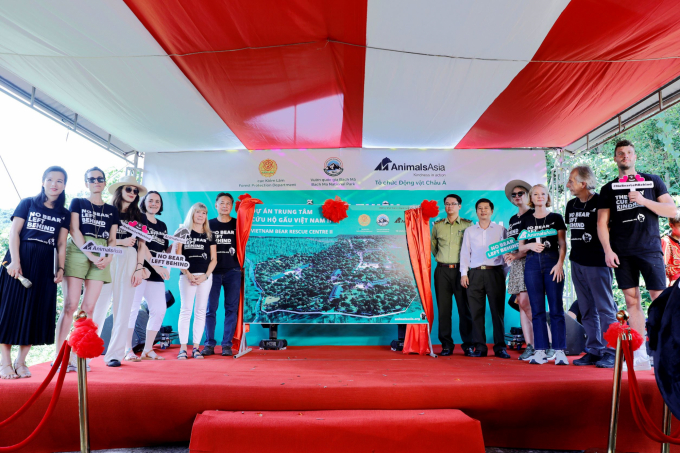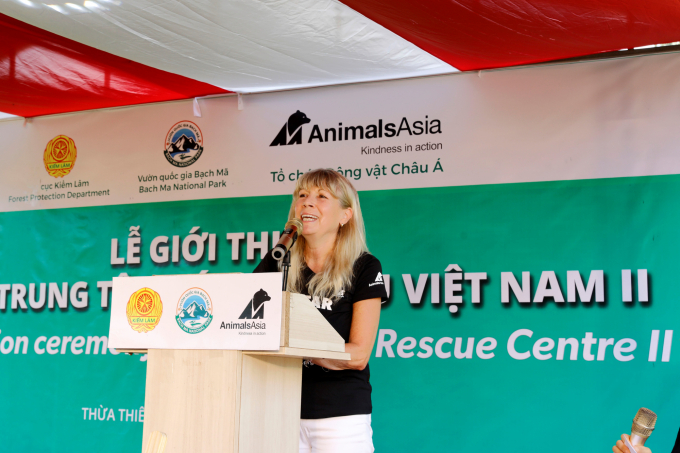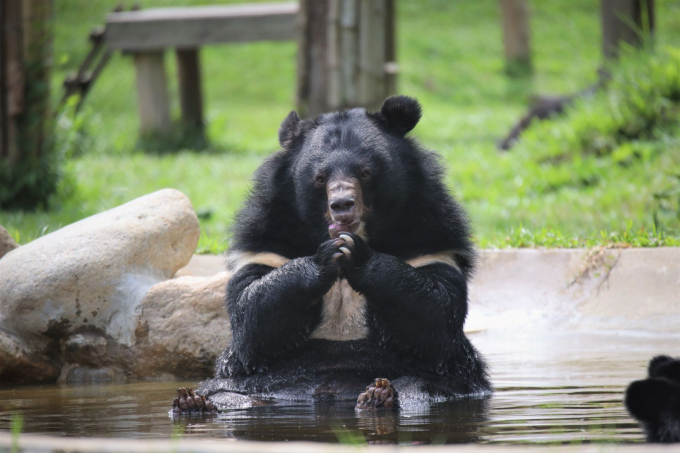November 27, 2025 | 04:42 GMT +7
November 27, 2025 | 04:42 GMT +7
Hotline: 0913.378.918
November 27, 2025 | 04:42 GMT +7
Hotline: 0913.378.918

Delegates and guests attending the introduction ceremony for the Project on Vietnam Bear Rescue Center II.
Animals Asia Foundation (AAF) held a ceremony at Bach Ma National Park on May 27 to introduce the project on Vietnam Bear Rescue Center II. The project is funded by the Animals Asia Foundation with a total capital of 10.5 million USD (equivalent to 242.5 billion VND).
Vietnam Bear Rescue Center II is an area of 12.7 hectares located in the Administrative Area of Bach Ma National Park, Thua Thien Hue Province.
The center is expected to complete all construction items by 2026 with 12 bear houses and 12 semi-wild areas, administrative and leisure areas for staff, isolation area, veterinary hospital area, bear food processing area, education and communication area, waste treatment area and other infrastructure facilities.
Once in operation, the Center expects to raise and rescue over 300 bears from private bear farms, violation cases as well as aim to end private bear farming by the end of 2026.

Dr. Jill Robinson MBE Founder and General Director of Animals Asia Foundation speaking at the introduction ceremony for the Project on Vietnam Bear Rescue Center II.
Mr. Nguyen Vu Linh, Director of Bach Ma National Park said: “With the aim to raise over 300 bears at the Bear Rescue Center in Bach Ma, I hope that Vietnam will soon end the breeding of bears for bile; and more importantly, bears in captivity will be relocated here for a better habitat.
When the Center is put into operation, local people will have more jobs opportunities and income; Bach Ma National Park will have more sites to visit, more models to educate and raise awareness for tourists and local communities on their responsibility and participation in protecting wildlife and the bears particularly"
According to the Department of Forest Protection, there are currently 870 bears kept in private facilities and households. More than 300 bears have been brought to bear rescue centers managed by the state.
Vietnam Bear Rescue Center 2 was established in the context that the Vietnam Bear Rescue Center, sponsored by Animals Asia in Tam Dao, Vinh Phuc province is operating at full capacity.
Animals Asia Foundation has previously signed a record of discussion to cooperate with the General Department of Forestry, Ministry of Agriculture and Rural Development. The parties aim to terminate 100% of the remaining bear farms in the country and locate them to rescue facilities in the period of 2017 to 2022.

Perspective model of Vietnam Bear Rescue Center II in Bach Ma National Park.
Dr. Jill Robinson MBE, Founder and General Manager of Animals Asia Foundation shared: “For Animals Asia Foundation, and our sponsors, supporters from around the world, this is an unforgettable moment. With the support, companionship and cooperation from the Government of Vietnam, Animals Asia Foundation has taken a historic step forward in national wildlife protection. We are proud that courage, empathy, perseverance and determination have and will bring about significant changes, as we push and pave a path foward to help one of the world's rarest, most vulnerable animals”.

Black bear in the semi-natural area at the Vietnam Bear Rescue Center in Tam Dao, Vinh Phuc.
In addition to the introduction of Vietnam Bear Rescue Center II, Animals Asia Foundation also launched a worldwide fundraising campaign, with the slogan Nobearleftbehind. An animated film related to this content will be premiered during an event in Vietnam and on social networks on May 27.
Translated by Nguyen Hai Long

(VAN) Tay Ninh’s livestock sector is undergoing a major transformation, applying high-tech, closed-loop circular models to build sustainable value chains.
/2025/11/26/3627-4-082628_818.jpg)
(VAN) From a small café on the red basalt highlands, Le Van Hoang started a business with clean coffee, building Enjoi Coffee into a symbol of organic agriculture in the Lam Dong plateau.
/2025/11/25/0045-1-135246_13.jpg)
(VAN) Ca Mau is researching a model of sea-encroaching embankments combined with viaducts and logistics service zones, aiming both to prevent erosion and create land funds for marine economic development.

(VAN) The information was shared at the seminar 'Urban Agriculture - Solutions for Developing Green Spaces,' organized by the Kinh te & Do thi Newspaper and the Biotechnology Center of Ho Chi Minh City.
/2025/11/19/4141-2-132831_216.jpg)
(VAN) One of Japfa's outstanding solutions is implementing digital transformation and artificial intelligence (AI) to optimize operations, enhance productivity, and advance sustainable development.
/2025/11/19/4847-1-093540_448.jpg)
(VAN) The Gia Lai Provincial People’s Committee had a working session with the delegation of the U.S. Department of Agriculture, the State of Idaho, and representatives of the State's leading enterprises.

(VAN) Ca Mau has a sufficient foundation to become a strong regional aquaculture center, where production integrates the economy, the environment, and the lives of the people.